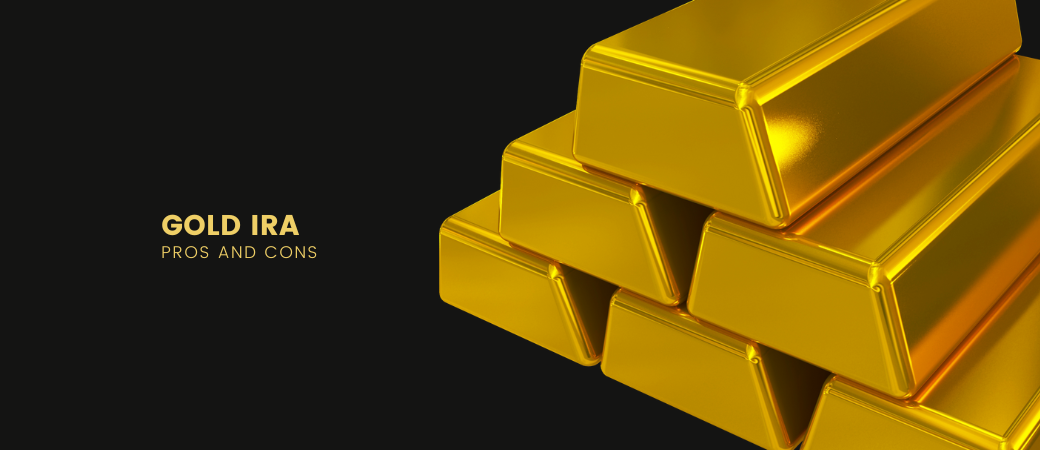Gold IRAs present appealing tax incentives, though they also come with some possible downsides that require careful thought. In this article, we will cover the pros and cons of gold IRA investments.
Amidst an economic climate characterized by heightened inflation, increasing interest rates, and banking instability, numerous investors seek avenues to safeguard their capital. While avenues like equities can yield substantial returns, they are also prone to considerable losses. Hence, it becomes crucial to diversify your investment portfolio with various asset classes to strike a balance between risk and reward.
Want to learn more about gold IRAs? Get the FREE wealth protection kit Americans are using to protect their retirement savings.
One method to introduce stability to your investment mix is by channeling funds into gold. Numerous strategies exist for gold investment, including gold backed IRAs. Similar to conventional IRAs, gold IRAs are retirement accounts providing appealing tax incentives, yet they also come with potential disadvantages that warrant consideration, which we will examine in this piece.
The Process of Investing in a Gold Individual Retirement Account (IRA)
In case you're interested in adding physical gold to your IRA, initiating a self-directed IRA (SDIRA) — one which you oversee — through an authorized custodian is the initial move. This custodian could be a financial institution like a bank, trust company, or brokerage that is approved by the IRS. However, it's noteworthy that many firms offering financial services and mutual funds that manage typical IRAs might not deal with the self-directed ones.
Moreover, it's essential to pick a dealer specializing in precious metals who will execute the gold purchases on behalf of your IRA (your custodian could potentially suggest one).
Remember that each self-directed IRA custodian might not provide the same investment options. Hence, prior to opening an account, ensure that they do offer physical gold as one of their investment choices. You have the liberty to establish the SDIRA as either a traditional IRA (contributions are tax-deductible) or a Roth IRA (distributions are tax-free).
The following step entails funding the gold IRA account either via a contribution (keeping contribution limits in mind), a transfer, or a rollover from an eligible plan, for instance, a 401(k), 403(b), or 457 plan.
Subsequently, you can choose investments for the retirement savings account, and your custodian along with the metals dealer will finalize the transactions for you.
Take note, it's not allowed to purchase just any bar or ingot. The physical metals must comply with the IRS "fineness" standards regarding their purity and weight and they should be kept in an insured IRS-approved depository. With respect to coins, your options are restricted to bullion coins produced by certain government mints.
Pros and Cons of Gold IRA and Investing in Precious Metals for Retirement
If you want to open a gold IRA account, you will have to find a right company to help you with the process. Get the FREE buyer beware guide and learn how to avoid deceptive gold IRA dealer lies.
A gold IRA rollover or transfer is a great way to investing in precious metals. However, when deciding on a gold IRA investment, it's vital to weigh the pros and cons:
Gold IRA Pros
Gold IRAs offer a number of benefits including inflation protection, the security of a safe-haven asset, portfolio diversification, tax advantages, and full control over a self-directed IRA.
Tax Benefits
Depending on the type of gold IRA established, you may receive tax incentives either upon depositing or withdrawing funds. Traditional IRAs and SEP (Simplified Employee Pension) IRAs allow tax-free contributions but tax withdrawals, while Roth IRAs tax contributions but offer tax-free withdrawals. Furthermore, contributions to both traditional and SEP IRAs are tax-deductible.
Inflation Protection
Given that gold prices generally rise when the dollar's value decreases, it acts as an effective hedge against inflation. Over time, gold has maintained its value despite the volatility of interest rates, leading to consistent returns.
Safe Haven
During times of economic instability, gold prices often remain stable, unlike other assets such as equities and bonds. This stability makes gold IRAs a reliable option for preserving capital, regardless of market conditions—a vital consideration for retirement savings.
Portfolio Diversification
Successful investment portfolios balance high-risk, high-reward assets with more conservative ones. While these conservative assets might not yield high returns, they also don't face significant losses. Gold fits this category, offering a counterbalance to the volatility of higher-risk assets.
Full Control
With a self-directed gold IRA, you have complete authority over your investments. You choose the custodian and depository you want to work with. It's up to you to select which gold coins or bars to purchase, and you determine when to liquidate your assets. When it's time for a distribution, you have the option to receive it either in cash or as physical gold, ensuring you can retain gold ownership even after withdrawing it from your tax-beneficial account.
Gold IRA Cons
Despite the numerous benefits of gold IRAs, they also come with some potential disadvantages, including lower growth potential, early withdrawal penalties, account fees, and a lack of dividends.
Limited Returns
While gold offers stability, it typically does not yield high returns like riskier assets. Therefore, diversifying your portfolio with various asset types is recommended.
Contribution Restrictions
All gold IRAs have an annual contribution limit. For the tax year 2023, the limit for traditional and Roth IRAs is $6,500 (or $7,500 for those aged 50 or above). In contrast, SEP IRAs limit contributions to 25% of self-employment income or $66,000, whichever is higher.
Early withdrawal penalties
Traditional and SEP IRAs impose penalties for withdrawals made before age 59 ½. These penalties include taxes on the withdrawn amount and a 10% penalty. This does not apply to Roth IRAs. If you're looking for an investment with better liquidity, purchasing physical gold, which can be quickly sold for cash, might be a more suitable option.
No dividends
Unlike investments such as stocks, which periodically distribute a portion of the company's profits (dividends) to shareholders, gold-backed IRA investments and precious metals IRAs do not offer this source of passive income. This drawback may be offset by other features of gold IRAs, but it's an aspect worth considering.
Fees
Opening a gold IRA may come with account setup fees. Additionally, ongoing maintenance, storage, and custodial fees can further reduce your profits.
Types of Gold IRA Accounts
Gold backed IRA accounts, akin to other tax-favored accounts, exist in diverse forms. Each type presents distinct benefits, so evaluating the most suitable choice for your present and future circumstances is advisable.
Traditional Gold IRA
A conventional gold IRA is a tax-favored account where your contributions can be deducted from your tax, up to a particular limit. You have the flexibility to distribute these contributions across various retirement investments, such as 401(k)s and other IRAs. However, after reaching the annual limit, all following contributions are subjected to a 6% tax penalty until the excess contribution is withdrawn.
As is the case with all pre-tax favored accounts, tax becomes due on your distributions once you initiate your retirement period.
Gold IRAs also adhere to a mandatory minimum distribution (RMD) rule when you attain the age of 72. Given that metals are considerably less liquid than paper assets, procuring cash for these distributions can be a struggle, possibly necessitating the sale of your gold at an unfavorable time.
Roth Gold IRA
A Roth gold IRA operates by exempting income tax on retirement distributions. Therefore, although you miss out on the advantage of tax-deductible contributions as with a regular IRA, you're not required to pay tax on your distributions during retirement.
Roth IRAs are a suitable choice for individuals who can forgo the immediate benefits of tax-deductible contributions in exchange for long-term gains. However, it's crucial to consult your financial advisor to understand which option suits you best.
Simplified Employee Pension Gold IRA
Simplified Employee Pension (SEP) gold IRAs are pre-tax favored accounts that come with higher contribution limits than conventional IRAs. These accounts enable self-employed individuals and business owners to contribute 25% of their yearly income.
Similar to conventional gold IRAs, these accounts are subject to taxes on distributions once you commence your retirement.
Investing in a Gold IRA
Investing in gold might resemble investing in securities and other paper assets, but key differences may influence your gold acquisition strategy.
Key Factors to Evaluate Before Opening a Gold-backed IRA
The initial decision to make prior to establishing a gold IRA investment is deciding whether to purchase physical gold bullion, gold coins, and other precious metals or opt for paper assets like gold mutual funds, gold mining stocks, and exchange-traded funds.
Owning tangible assets can be appealing, but it demands a bit more effort. If you acquire physical gold for a gold IRA investment, you can't keep your gold bars and coins in a typical safety deposit box or at your residence — they must be stored in an IRS-approved depository. Also, you need to ensure that all the procured precious-metal bars and coins adhere to certain IRS quality standards; otherwise, they might not qualify for your IRA.
Top-Rated Gold IRA Companies
Gold IRAs are a favored choice for retirement planning, and there are many reliable firms in the industry that focus on gold IRA services. This article explores some of the most noteworthy companies in this field.
#1. Augusta Precious Metals
Augusta Precious Metals, a reputable precious metals IRA company, is among the most prominent gold and silver traders in the U.S. Investing with them allows you to direct your assets to multiple depositories. They will deliver your coins and bullion into storage at no cost. They have a variety of precious metal products that are IRS-approved.
Every new client is allocated a personal manager that helps them manage a gold backed IRA account. You can manage your portfolio independently or seek assistance from the firm's skilled financial advisors or precious metals specialists. Their website features a wealth of educational content to support your investment decision-making.
#2. Goldco
This firm provides precious metals to investors seeking to enhance their retirement savings. With Goldco, you have the liberty to make your own investment decisions or opt for the guidance of their expert staff.
They take great pride in their customer service, offering professional, amicable advice that might exceed your expectations. You can arrange for your coins or bullion delivery, or direct your assets towards retirement funding, thereby diversifying your retirement planning portfolio. Goldco equips investors with numerous informative resources to aid in informed decision-making. They offer a variety of precious metal assets approved by the IRS.
#3. American Hartford Gold
American Hartford Gold provides investors with a variety of gold and silver coins. They also assist in establishing a silver or gold IRA as part of your retirement strategy. If you have an IRA worth $10,000 or more, American Hartford offers a complimentary rollover into a gold IRA.
They do not charge additional IRA fees, although you will be required to pay the SDIRA company. You might also qualify for three years of free storage or $15,000 worth of silver coins. American Hartford Gold provides investors with a buyback guarantee, ensuring swift access to funds when necessary.
What Potential Pitfalls Come With Investing in Precious Metals?
No investment is entirely devoid of risk, however, precious metals have a well-documented track record of providing steady gains. Due to their independence from governmental control, and thus immunity to political or economic disruptions, these minerals typically offer a dependable investment over time.
Nevertheless, there are certain hazards associated with investing in precious metals. For instance, worldwide events and the availability of mining resources can provoke fluctuations in the price of these minerals, governed by the laws of supply and demand. It is crucial to be aware of these risks to make well-informed investment decisions.
Nonetheless, precious metals generally prove to be a robust investment and perform well during economically unstable periods, aiding in the preservation of your funds.
What Advantages Do Precious Metals Have Over Stocks?
Several advantages make precious metals a more appealing investment choice over stocks and ETFs. Stocks and ETFs can be significantly affected by political and economic factors, making them considerably more volatile compared to precious metals.
Furthermore, certain stocks may suffer from low liquidity based on the company's capacity to settle its short-term liabilities. If a share exhibits low liquidity, it indicates that the company may be at risk of insolvency, leading to potential financial loss for the shareholders.
In contrast, precious metals often display more stability during periods of economic turbulence. Since these minerals possess inherent value, they have historically maintained their stability even in volatile times, including an appreciation in value that keeps pace with inflation.
While stocks are dependent on specific companies or conglomerates, precious metals act as a refuge against market instability, allowing for the safeguarding of your wealth. Moreover, incorporating precious metals into your investment portfolio can be an excellent strategy for diversification, as they are not linked to the stock market, thereby reducing your total portfolio risk.
The Pros and Cons of Gold IRAs: The Bottom Line
Gold IRAs offer a hedge against inflation, diversification of portfolio, and tax advantages. However, like any financial instrument, they also have their disadvantages, including contribution limitations and relatively lower returns compared to other investments. It's better to consult with a financial advisor to determine the best choice for your unique financial situation.
If you're interested in learning more about the advantages and disadvantages of gold IRA investments, click here to download Augusta Precious Metals' complimentary 'Buyer Beware' guide.




